
Freshfel Europe Headlines – Edition 6, 2021

Freshfel Europe to take part in a new EU promotion project in 2022
Starting from March 2022, Freshfel Europe will continue its efforts to improve the level of fruit and vegetable consumption among Millennials by joining a new EU promotion project led by Interfel and with the cooperation of Bord Bia and Association Interprofessionnelle de la Banane. The project, which will be officially launched early next year, will provide practical and educational content on how to include more fruit and vegetables as a part of a healthy diet, with the goal of increasing their consumption among 25-40-year-olds, which is estimated to be well below the 400 grams per capita per day recommended by the WHO.
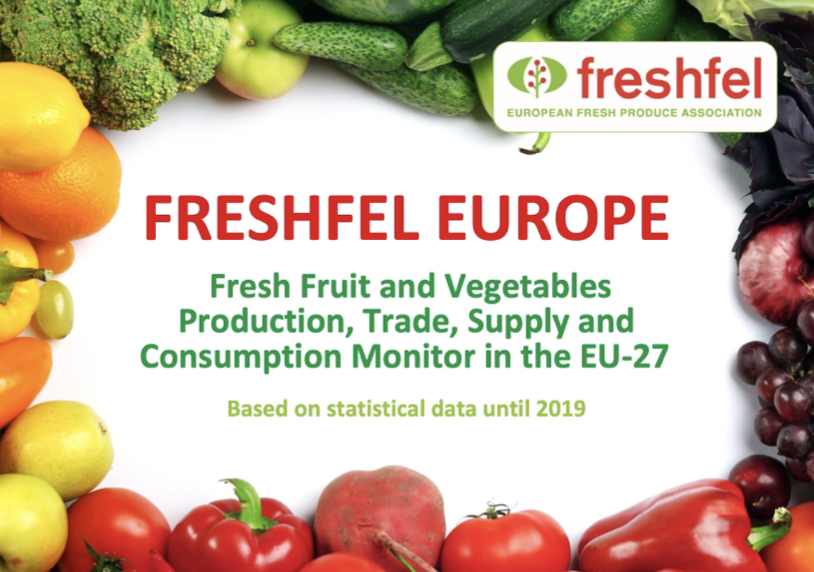
Freshfel Europe urges the sector to act now to fill the gap of consumption with minimum health recommendation
On the occasion of the release of the Freshfel Europe Consumption Monitor on 16 December 2021, experts from across Europe and the supply chain reviewed the latest consumption trends in 12 EU Member States plus the UK. The Freshfel Europe Workshop provided an in-depth review of the consumption situation from different angles and perspectives. The meeting was inspired by the results of a pan-European study on the evolution of consumers profile across 11 Member States, which addressed the age gap and gender gap, adjustments the business model in the extraordinary time of the COVID-19 pandemic, understanding the paradox between local demand on online development, and the perception of consumers of sustainability buzzwords. Research shows there is a clear segment interested in premium quality products also among people with lower income, with flavour and freshness being the determining factors. The Freshfel Europe experts also reviewed the latest trends in 12 EU Member States as well as in the UK. The Consumption Monitor, which is based on figures up to 2019, was complemented by an analysis of the consumption trends in 2020 and 2021, which are characterized by the COVID-19 pandemic. As the Consumption Monitor figures indicate that fruit and vegetable consumption decreased to 349,19 gr/capita/day, Freshfel Europe urges the sector to build on the environmental, climate, and health benefits of a plant-based diet throughout 2022, with the goal of 400 gr/capita/day or half of the plate each meal.

Freshfel Europe raised supply chain concerns about the fragmentation of the Single Market on the plastic packaging strategy for fruit and vegetables
On the 1st of January, plastic packaging and non-home compostable stickers will no longer be authorized for sales to consumers in France. These developments are taking place among others in the transposition of the European Directive on plastic reduction. France is opting for a phase-out of plastic packaging of less than 1,5 kg. The option of reusable/recyclable plastic packaging is not considered. The French decree is going beyond the requirement of the European Directive. Freshfel Europe voiced its concerns to 6 Commissioners to alert them on the consequences of the French decree which might not only challenge the good and fair functioning of the Single Market but also endanger other priorities in the area of quality, safety and hygiene or food waste. The fruit and vegetable sector is strongly engaged in its support of the European Green Deal and Farm to Fork Strategy, including its commitments towards the reduction of plastics packaging. Changes should be progressive, securing access to alternative solutions that maintain quality and safety of products, information to consumers and competitiveness. Freshfel urged to Commission to safeguard the integrity of the Single Market and prevent the proliferation of different strategies to reduce plastic use.

Freshfel Europe environmental footprint project in the pipeline
In the last 6 months, Freshfel Europe has been reviewing with its members the various aspects and expectation of the sector in regard to setting up a methodology and a tool to measure the environmental footprint of the fruit and vegetable sector. The Freshfel Europe Working Group on Environmental Footprint, open to all Freshfel Europe members from across the fresh fruit and vegetable supply chain, has identified a need to develop a common sector methodology, database, and environmental footprint tool. This has been approved by the Freshfel Europe Board. The objective of this initiative is to ensure the sector is fit for market and policy developments on environmental footprint so that the sector is not left behind. This initiative would be based on and built upon Freshfel Europe members’ existing work and knowledge. In view of market and policy developments on environmental footprint under the European Green Deal, this initiative could be Product Environmental Footprint Category Rules-based (PEFCR) and as such recognized by the European Commission. The first step in the roadmap is to establish a coalition of Freshfel Europe members by February 2022 and potentially other relevant stakeholders, to initiate work on a common sector methodology. Freshfel Europe will support the initiative, acting as the sector-body representative and platform for dialogue and action. Environmental footprint measurement will become not only a much-needed instrument for the sector but also soon a requirement of the legislation.

Freshfel Europe alerts on the consequences of the Belarus embargo as of 1st January
Promptly after the announcement on the 6th of December by Belarus of the launch of an embargo upon import of various agriculture products into this country, Freshfel Europe identified the far-reaching implications of such an embargo due to be effective as of 1st January 2022. This embargo will impact around 10% of current EU exports to third countries, representing around 400 to 500.000 T of fresh fruit and vegetables. The embargo is initially scheduled for 6 months. It will primarily affect apples and pears, but other products are also at stake including berries, kiwifruit, tomatoes, and onions. Poland and Lithuania are on the front line and most impacted by the upcoming measures. These two countries are exporting their own products but are also a platform of re-export for products originating in other member states. Freshfel Europe urges the Commission to evaluate measures that could assist growers and exporters to cope with the ban and also secure stability on the EU markets. Once again, European fruit and vegetables are the hostages of international geopolitical disputes. In 2014, the Russian embargo deeply hit the fresh produce sector, challenging a well-established business of more than 2 Mio T of export to a neighbouring market. The European fruit and vegetable sector is already bearing about a third of the 7,5 billion € worth burden of the Russian embargo. Later in the decade, the Algerian embargo affected close to 300.000 T of export. Most recently, the USA also included fruit and vegetables in retaliation measures impacting in particular the citrus category. Freshfel Europe can only lament that fruit and vegetables are too often taken as a bargaining chip for other disputes, with the sector being a bystander in these disputes.
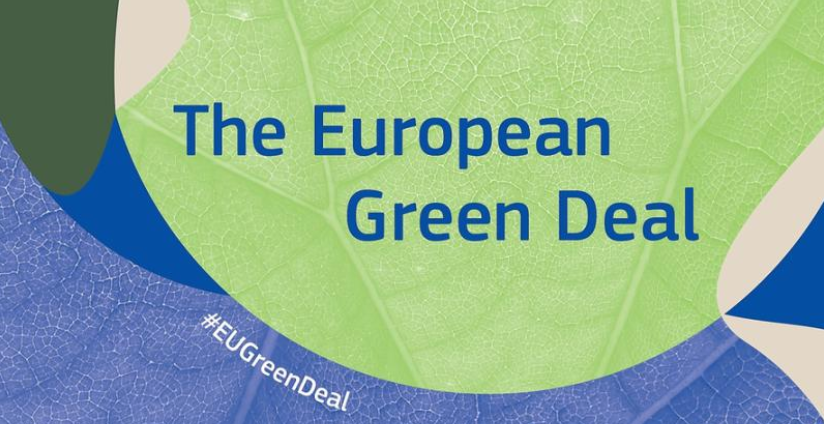
Virtual workshop sharpens strategy to respond to sustainability challenges in Green Deal context and to secure that sustainability remain “sustainable” for the fruit and vegetable sector
Freshfel Europe has held a virtual workshop at the end of October 2021, to assess together with its members the strengths, weaknesses, opportunities and threats of the European fruit and vegetable sector in the current Green Deal debate. The requirements of the Farm to Fork Strategy as well as the global sustainability debate will shape the production and trading environment of the fresh produce industry for the upcoming years. While fruits and vegetables as part of a plant-based diet mark big strengths and opportunities, the sector lacks stronger attention to an enabling regulatory environment – when it comes to strengthening investment and finance capacity and fostering innovation. The results of the workshop will be included in the Freshfel Sustainability Strategy Paper, to be launched in early 2022, which will be serving as a guidance document throughout the upcoming period of regulatory and public debates, with the purpose to create more visibility for the sector’s needs and to position plant-based diets at the heart of the sustainability debate.
As costs around the sector are rising sharply in a wide range of services and input, Freshfel Europe will closely monitor the situation to secure that all the initiatives relating to sustainability, which is also done at a cost will keep the sector competitive, allowing sustainability initiative to remain sustainable for the fruit and vegetable sector.

Freshfel meets DG SANTE Traces & Plant Health teams to push for Europhyt system improvement and urges SANTE Director General in formal letter
Following the concerns raised by members in the past months over the need for improvement of the EU’s Europhyt notification system, the Freshfel Secretariat coordinated a meeting with DG SANTE Traces & Plant Health teams. During the meeting, Freshfel and its members explained the importance for the sector to improve the current reporting system towards a more modern, complete and timely notification system like the RASFF. This would not only ensure faster early warning of hotspots for fresh produce supply chains but also allow a better contextualization of non-compliances, facilitating the resolution of plant health challenges and the implementation of targeted mitigation measures. As a follow-up, Freshfel issued a formal request letter to DG SANTE Director General Sandra Gallina, asking for sufficient resources to be mobilized to ensure the modernization of Europhyt in the short and long term.
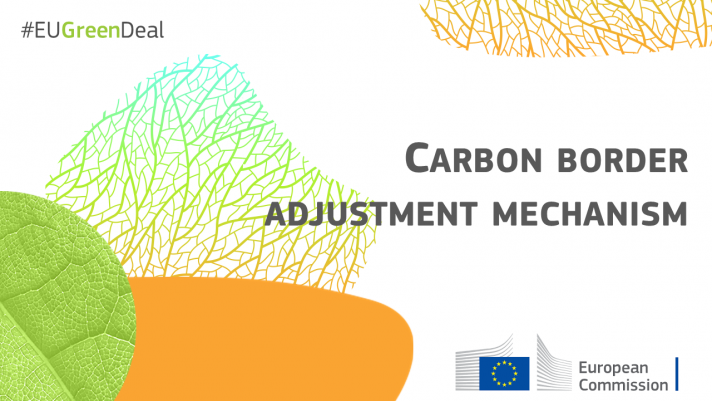
Freshfel contributes to DG TRADE consultations on new proposals towards a new Generalised System of Preferences Scheme and a Carbon Border Adjustment mechanism
In November, Freshfel contributed to the open EU consultations towards a new Generalised System of Preferences Scheme and a Carbon Border Adjustment mechanism. Regarding the GSP Scheme, Freshfel warmly welcomed the EU’s work towards reconducting the GSP scheme, given its overall positive effect on the industry and economic development. The contribution also welcomes the inclusion of environmental sustainability considerations under the scheme, as well as the addition of safeguard provisions to protect sensitive European production. On the Carbon Border Adjustment mechanism (CBAM), Freshfel hailed the exclusion of fresh produce under the scope of the new instrument as proposed by the Commission. Fresh fruit and vegetables have one of the highest consumption recommendations by the World Health Organisation (at least 400g per capita per day) and have the lowest environmental impact in their production compared to other agri-food sectors, which would make the inclusion of this category under the scope of the CBAM counterproductive to achieving the objectives of the Farm to Fork Strategy. In addition, since fertilisers have been included under the scope of the proposal, Freshfel urged the Commission to closely analyse and monitor the impact of the CBAM’s implementation in the prices of inputs for EU F&V production, in order to trigger potential safeguard actions should an increase in fertilisers’ costs damage growers’ incomes, which are particularly sensitive in the current context, where the sector is working on tight margins.

Freshfel attends the plenary meeting of the food chain and animal and plant health: Preparation for challenges along the food chain in 2022
The European Commission’s Advisory Group of the food chain and animal and plant health has held its plenary meeting virtually on the 26th of November 2021. The meeting, gathered food chain representatives from the private sector and the European Commission to discuss current food chain matters, provided a wholistic wrap-up of the ongoing regulatory debates alongside the food chain including a preparatory outlook on the upcoming discussions about the “Sustainable Food Systems” initiative, which will closely circulate around better education of the consumer via environmental and nutritional environment. The meeting further provided for an outlook on upcoming plant health regulation updates as well as additional preparation on the upcoming introduction of new control elements for organic produce in the context of the finalisation of the organic reform, which will change many organic fresh produce trade requirements to the EU. Freshfel Europe will therefore particularly monitor the implementation of the new control requirements and further carefully prepare the discussion around environmental and nutritional labelling. The meeting was chaired by Natalie Chaze, Director for Food sustainability and International Relations in DG Santé.
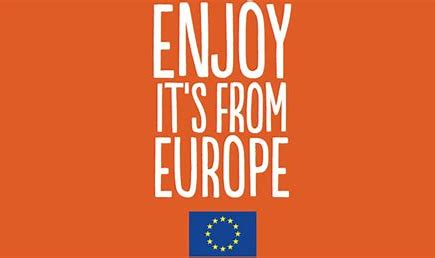
Freshfel Europe joints forces and steers with COPA COGECA a coalition of 11 European Association on promotion policy matters
Freshfel Europe represented the views of the fresh produce sector regarding the priorities for the annual work programme 2022 as well as for the upcoming reform of the promotion policy. Freshfel Europe has warmly welcomed the continuation of a dedicated budget for fruit and vegetables for the AWP 2022, an important tool to contribute to the move of a more plant-based diet. Freshfel also voiced concerns to avoid discrimination in the promotion of production methods. Besides organic, many other sustainable production methods are in place and should equally be accessible for promotion. It would not only be highly detrimental from an economic point of view, but it would also be counter-productive from a sustainability perspective. This would discourage producers from using other methods of production to further improve their sustainability. Promoting organic fruit and vegetables on third-country markets might not necessarily either be the priority to stay competitive on the international market. As progress will be done in regard to the reform of the policy, Freshfel Europe will remain active in the different fora to voice the interest and benefit for the fruit and vegetable sector of this policy.

Freshfel Europe focus on Asia
Freshfel has reviewed with its members exporting to Asia the evolution of market access conditions and pending hurdles to export to China, Japan, Vietnam, Indonesia, Thailand, the Philippines, and India. Today, European exporters are shipping more than 400.000 T, but the potential would be still much higher if several of the pending hurdles could be addressed. New opportunities could be unlocked, and more trade facilitation could be gained by joined actions to alleviate the current market restrictions. Freshfel Europe will join forces with the European Commission to secure an effective benefit on market access with countries with an FTA, such as Japan, South Korea, or Vietnam, but will also work to join forces on current hurdles or discriminations among European suppliers in the market access in Asia, looking forward to boosting position in the region, as the total market share of European produce remains slow in the region.

Environmental Footprint Working Group: Continued learning on global “footprint” initiatives
Freshfel Europe has held another session of its bi-annual environmental footprint working group, to create a better understanding of different initiatives to measure “environmental” footprints in the fruit and vegetable sector, with the aim, to create a common understanding and harmonized approach towards measuring and reporting environmental footprint in the sector. This session was shaped by guest speaker the South African Citrus Growers Association’s Industry Manager Paul Hardman, who gave valuable insights into the “Confronting Climate Change” initiative of the South African Fruit and Wine industry. He explained how the data is measured, reported, and used to improve the carbon emissions during agricultural production and how to identify potential emission sources and replace them with more suitable technology. This presentation has been completed by Christoph Walter from ColeACP, who had developed a comparative methodology of various footprint initiatives, which have been in particular made accessible to developing countries, with the aim to improve the environmental footprint in the agricultural production.

Freshfel clarifies scope of China’s reform on registration requirements of facilities for vegetables exports to China
Freshfel Europe has been closely monitoring the implementation of China’s Decree 248, which will come into force in January 2022. As vegetables are part of the list for new production facility registration requirements according to the legislative text, Freshfel has been seeking clarification in understanding the scope of the new measure by attending various meetings of the DG Trade with GACC – the Chinese Customs Administration to understand how the sector needs to take precautionary steps to ensure the continued possibility to export vegetables to China. In conjunction with Freshfel’s China network together with the support of the EU Delegation in Beijing and DG Trade in Brussels, Freshfel could eventually clarify the legal interpretation of the rule which do not apply to products, which have already protocol requirements for the export in China in place, which is the case for most all current European vegetable exports to China. Until 2019, fruit and vegetable exports to China have been growing by a double-digit growth rate, but the market is currently challenged by the current trading environment, logistic challenges as well as increased sanitary control requirements.

With finalisation of the organic reform and coming into force in January 2022: Freshfel continues to monitor and clarify new trading conditions for organic through attendance to Civil Dialogue Organic and member webinar in October 2021
Freshfel has been working over the course of autumn 2021 towards further clarification of the new rules for organic production and trading environment, implemented through various delegated and implementing acts, which are currently being finalised by DG AGRI. The main topics of concern have been the unclear scope of application on certain products and substances for organic production as well as various control and trade elements. Freshfel attended the Civil Dialogue of DG AGRI’s Organic unit at the end of September and flagged in the meeting key challenges of the current reform in production and control areas. Furthermore, Freshfel has organised a meeting on the 13th of October 2021 with the support of DG Agri’s Head of Unit for Organic, Ms. Elena Panichi, accompanied by various experts from the organic team, with the aim to gain clarification on the general state of play of the reform, the EU action plan for stimulating production and consumption, the application of new control rules for organic produce through border control post only, the new organic as well as the new production conditions. The meeting was open to Freshfel members. The new rules will come into force in January 2022.

Webinar on temporary increase of official controls, emergency measures and risk assessment
In December, Freshfel Europe organised a webinar on temporary increase of official controls and emergency measures. During the webinar, Delegate General of Freshfel Europe Philippe Binard and the Director Food Quality Egle Baecke together with the speakers from the European Commission discussed various important aspects related to Regulation (EU) 2019/1793: evaluation practices of the European Commission regarding compliance, transparency on data and the model behind the decisions of listings/de-listings/the increase or decrease of control percentage, transparency towards public/FBOs (in EU & non-EU countries), RASFF Portal’s role in the bi-annual revision of Annexes of Regulation (EU) 2019/1793 and the use of RASFF Portal by the EU MSs. The webinar provided the members with knowledge on the decision making of the European Commission. Freshfel Europe will follow up on this matter with the European Commission at the start of 2022.
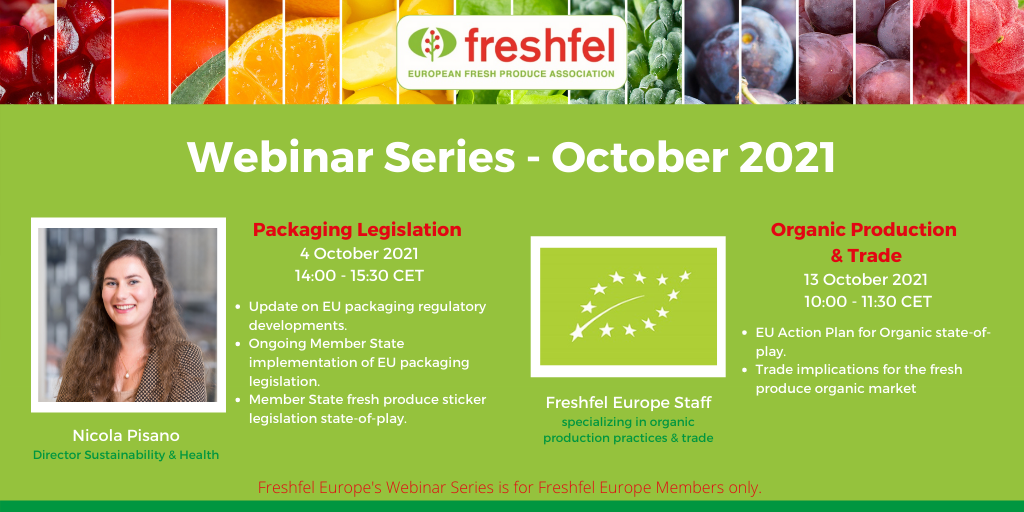
Webinar on EU and Member State packaging legislation
In October, Freshfel Europe organised a webinar on EU and Member State packaging legislation. The well-attended webinar provided the members with the most recent update on the ongoing policy developments in this area. During the webinar, Freshfel Europe Director Sustainability and Health Nicola Pisano provided an update on the Single-use Plastics Directive, Waste Framework Directive, Packaging and Packaging Waste Directive and the Member States Sticker legislation. Freshfel will keep monitoring the European and national packaging legislation and will provide detailed updates to its members in a timely manner.
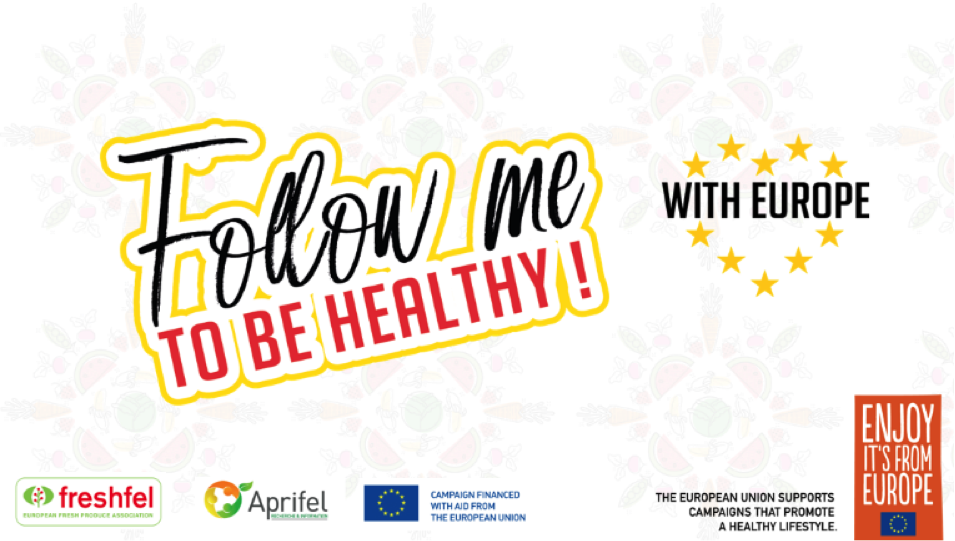
Follow Me to be Healthy with Europe: Three-year digital-first campaign, aimed at inspiring young Europeans to eat more fruit and vegetables, comes to a successful close
The “Follow me to be healthy with Europe” digital-first campaign – launched by Freshfel Europe and Aprifel in July 2019 – has come to a successful close following its three years aimed at promoting a healthy, balanced diet for 18-30-year-olds in Europe. Living online under the hashtag #400gChallenge, the goal of the campaign was to encourage young Europeans to increase their consumption of fruit and vegetables to a minimum of 400g a day, to improve and ultimately transform millennials’ dietary habits. This is in line with recommendations from the World Health Organization (WHO) around the consumption of at least 400g of fruit and vegetables a day. Additionally, with this generation recognised as being hyper-connected and processing much of its content online, the digital-first nature of this campaign allowed it to succeed in raising awareness despite the challenges wrought by COVID-19. Since its launch, it has generated more than 64 million impressions on social media and accrued +1.6 million video views. This was all through the use of 30 videos, infographics and collaborations with more than 20 influencers from six European countries, who encouraged young Europeans to share tips to easily integrate fruit and vegetables into their daily diets. Prior to the COVID-19 restrictions, the campaign also met with more than 2,500 people during three different events.
